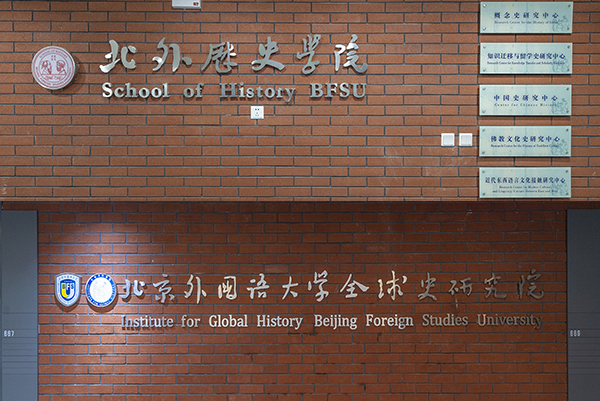- Research
- Research Centers
- Journals
- Admission
- Introduction
- Programs
- Application
- Alumni & Giving
- Alumni Club
- Giving

Beijing Foreign Studies University (BFSU) is a university under the direct administration of the Ministry of Education (MOE). It is one of the first universities listed under Project 211, part of Project 985’s Innovation Platform and among the first batch of institutions selected for the Double First-Class Initiative of China. Today, 101 foreign languages are taught at BFSU.
Capitalizing on its distinctive foreign language strengths, BFSU established the World History Teaching and Research Office as early as 1960 to conduct teaching and research in world history. In 2014, BFSU founded the Institute for Global History. Building on this foundation, the School of History was established in 2017. Later, five research centers were established, including the Center for Knowledge Transfer and Study Abroad History, the Conceptual History Research Center, the Chinese History Research Center, the Buddhist Cultural History Research Center, and the Modern East-West Language and Cultural Contact Research Center.
The school primarily focuses on the historical processes of the world and China since the Age of Discovery. It is committed to exploring how civilizations, as interdependent entities, have driven the progress of world history through their interaction, and to understanding the patterns of interaction and symbiosis between China and other civilizations from the perspective of the history of civilizations.
The school has three teaching and research divisions for world history, Chinese history, and Sino-foreign relations history. The World History Research Division focuses on the historical examination of the economic, social, political, and cultural developments across various regions, nations, and ethnic groups. The Chinese History Research Division emphasizes the exploration of the historical origins and evolution of Chinese civilization. The Sino-Foreign Relations History Research Division adopts a global historical perspective to conduct holistic studies that integrate Chinese history with the histories of diverse global civilizations. Through the lens of global history, this division investigates the historical interactions among multiple civilizations, emphasizing their interconnectedness within a worldwide framework.
As a teaching and research institution, the School of History at BFSU offers compulsory courses such as general history and theories of historiography, as well as a wide variety of elective courses with research depth. At the same time, it is responsible for offering general education courses across the university. In addition to teaching, members of the teaching and research team of the School of History have made considerable achievements in their respective professional research fields.
The School of History currently offers two undergraduate majors, namely World History, and Foreign Language and Foreign History, a master’s degree program in the first-level discipline of World History, and a doctoral program in Global History and Chinese Studies under the Comparative Literature and Intercultural Studies sub-discipline of the first-level discipline of Foreign Languages and Literatures.
The School of History has a complete student training system at the bachelor’s, master’s and doctoral levels. With a distinctive focus on historical research from a global perspective, the school has developed a well-structured, effectively integrated and mutually reinforcing system of curricula, research and disciplinary development across its three disciplinary directions: Chinese history, world history and specialized history. Of the three directions, Chinese history emphasizes solid basic training in history, world history emphasizes specialized research on regional and national history, and specialized history underscores cutting-edge research and extensive interdisciplinary integration.
In terms of international education, the School of History focuses on “local internationalization” and “global participation”. It actively introduces high-quality international educational resources, participates in the opening up of education, and enhances the internationalization of talent cultivation and academic research, building a faculty team with an international perspective.
The School of History employs foreign experts to actively participate in the construction and development of its disciplines and majors. These experts come from the United States, Germany, Austria, Russia, Japan, South Korea, and other countries and regions. They include some of the world’s most renowned scholars and academic leaders. They conduct thematic lectures at BFSU, hold academic workshops, participate in conferences, teach and enlighten students, cooperate internationally with the school, and jointly publish academic achievements.
In addition, the school places great emphasis on building an international talent training platform. It is in collaboration with some 10 well-known universities abroad, offering teacher-student exchange, joint training, joint scientific research, and short-term study abroad programs. Among them, the “Eurasia Doctoral Students Forum”, held annually, is co-organized by the school with world-renowned universities such as the University of Bonn and Erlangen-Nuremberg University in Germany, Sapienza University of Rome in Italy, the University of Vienna in Austria, Kansai University in Japan, and Hankuk University of Foreign Studies in South Korea.